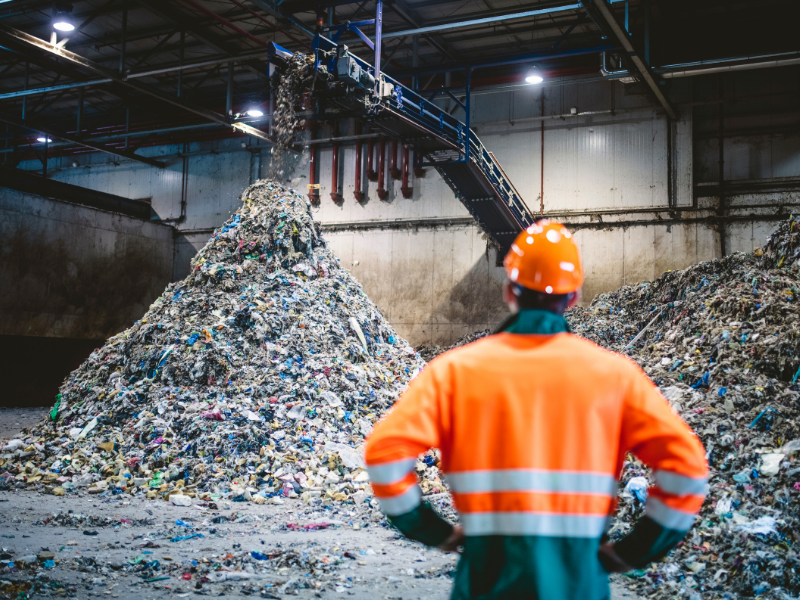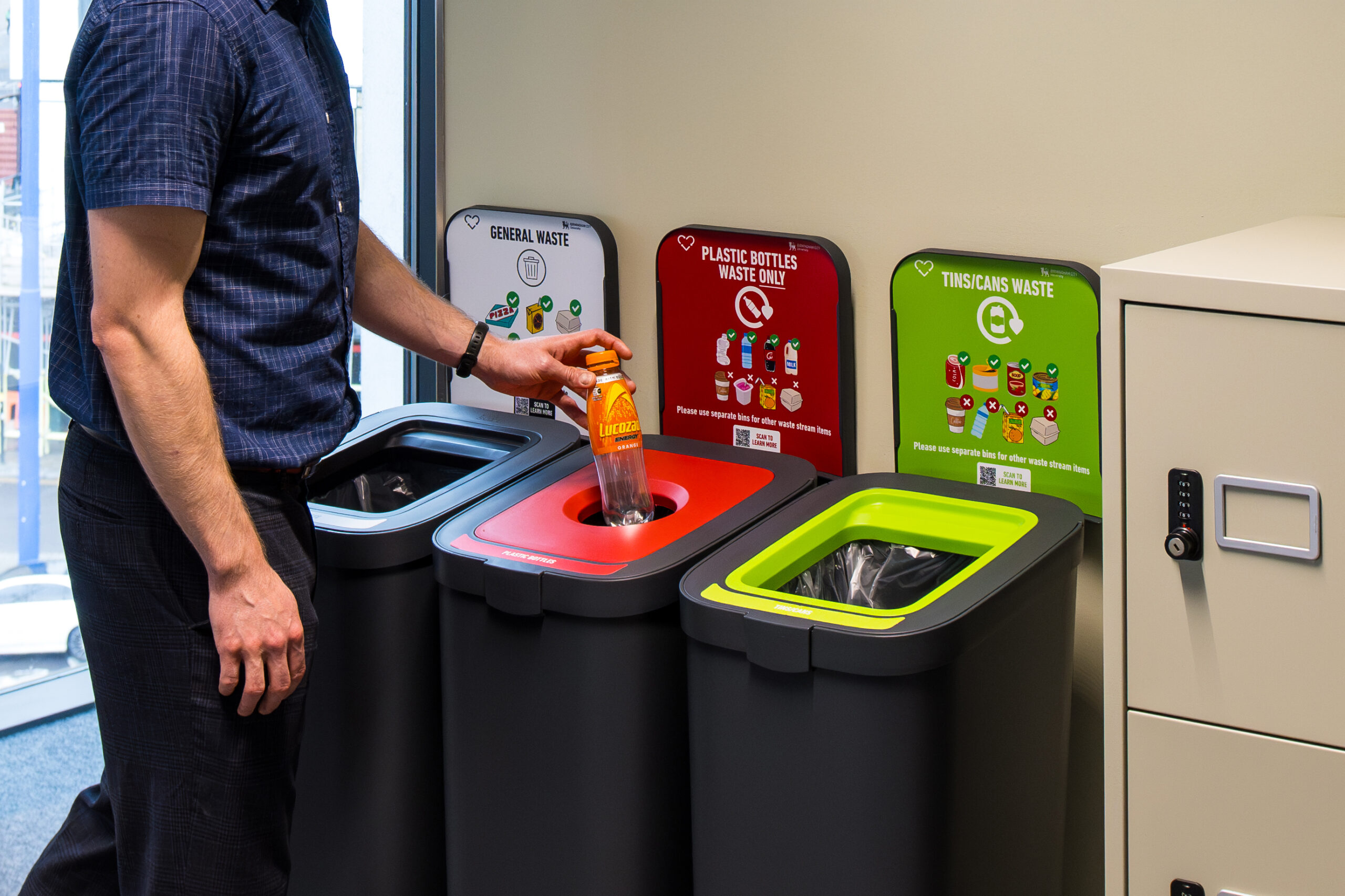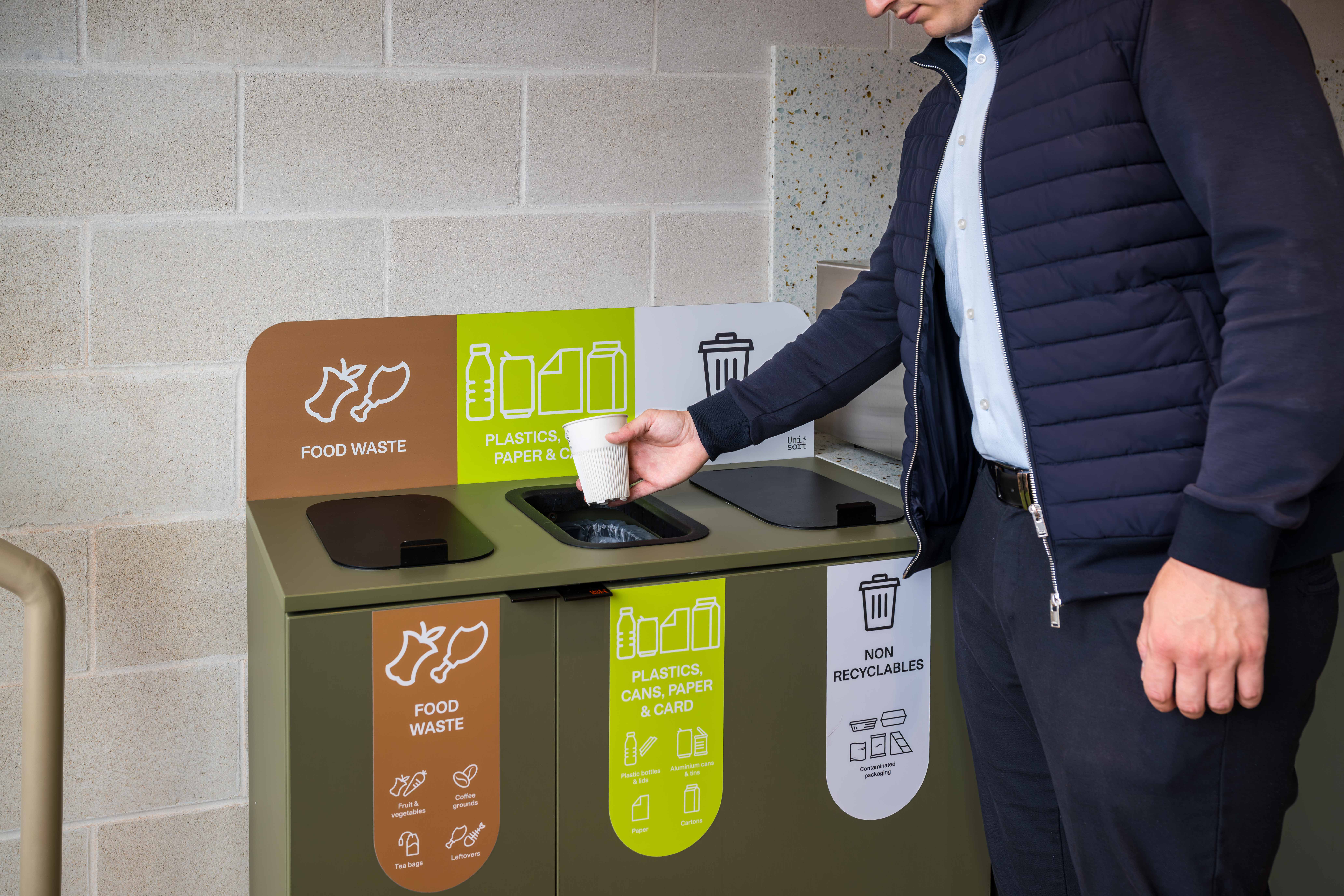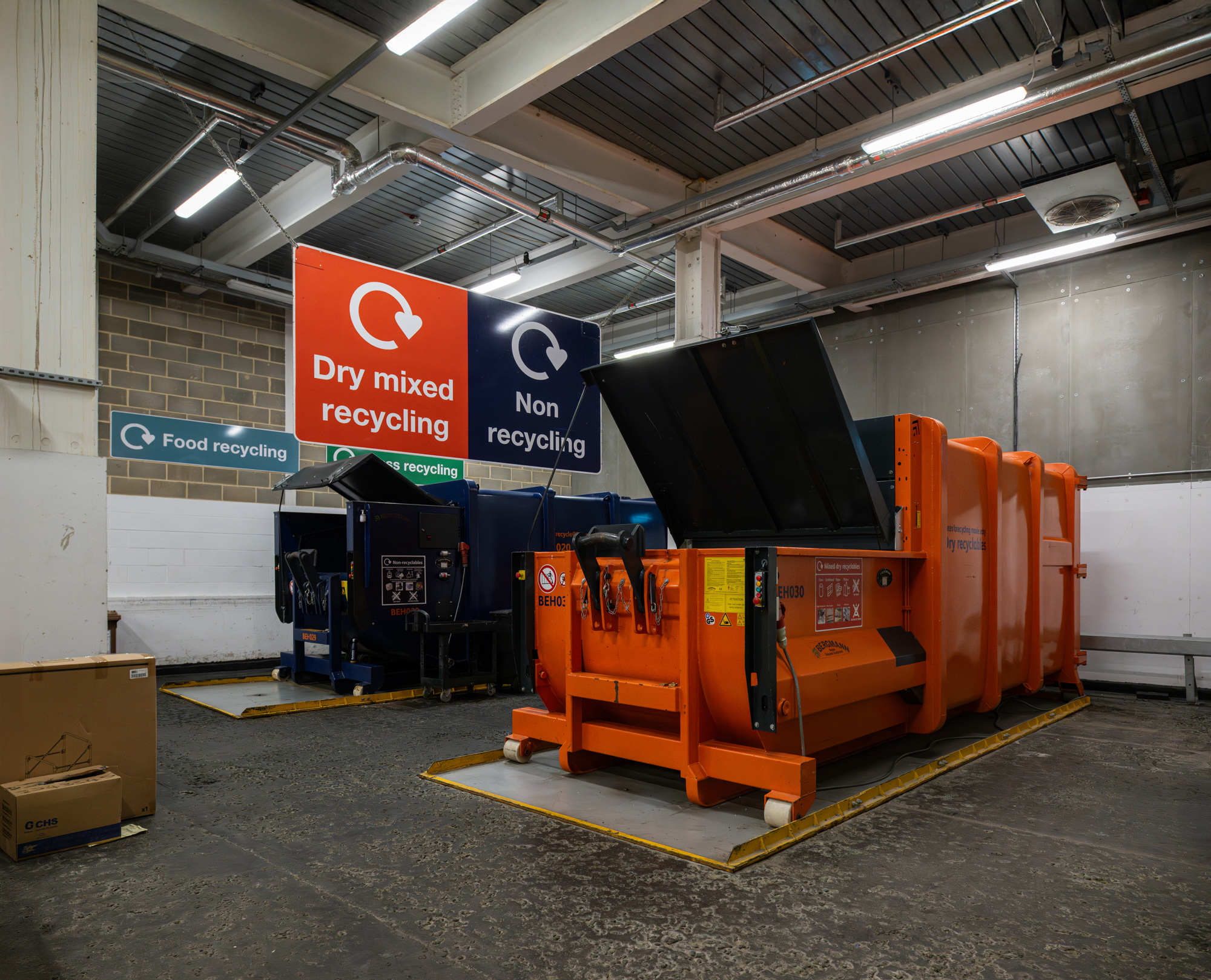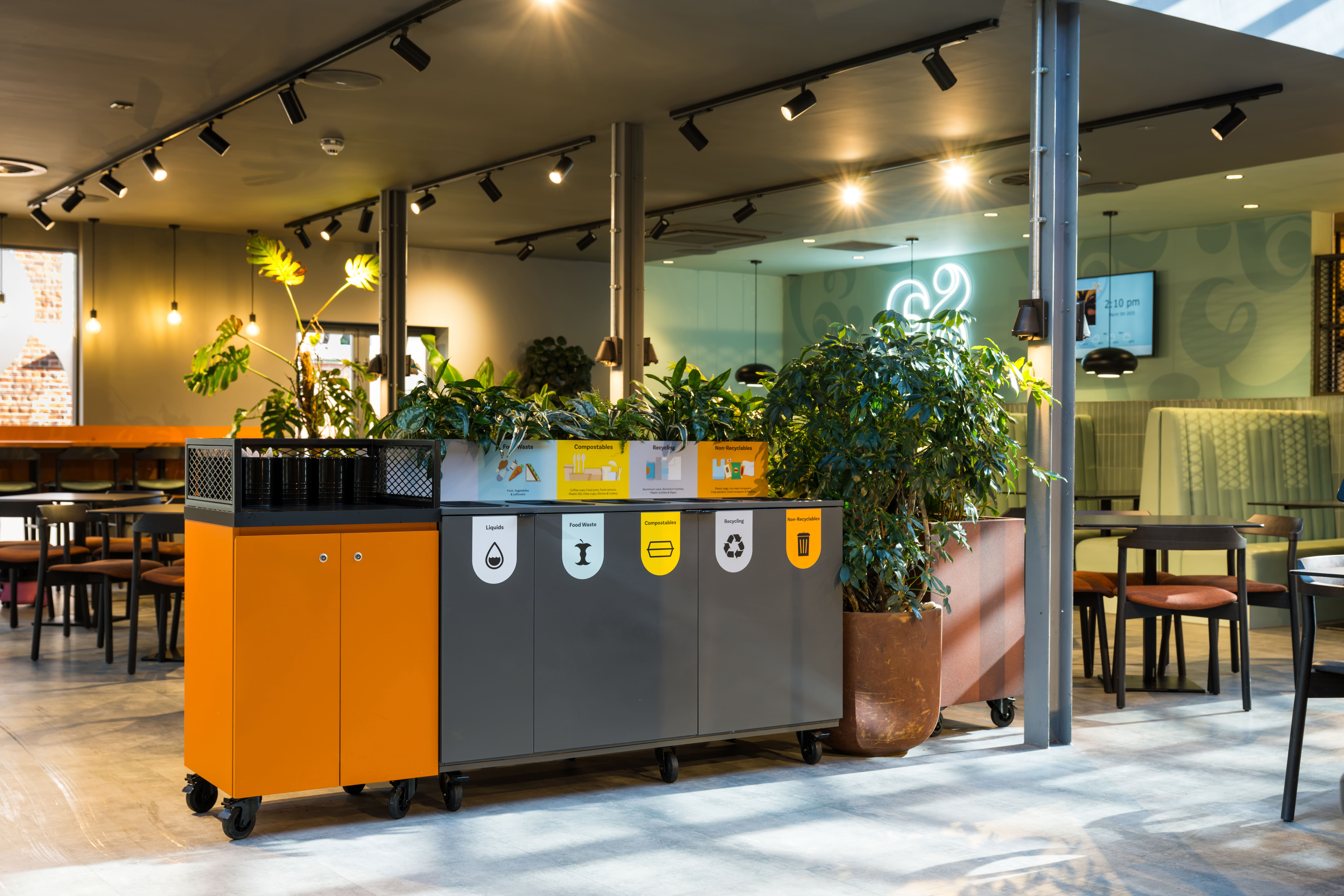Recycling contamination in commercial facilities can cost more than you think. Fines, wasted budgets, increased collection costs, damaged reputation and failing to hit sustainability targets can all result from poorly designed recycling systems.
We uncover the most frequent recycling missteps UK businesses commit and show how Unisort’s solutions help you avoid costly mistakes and meet sustainability targets.
Contamination: The Silent Recycling Killer
Disposing of waste into the wrong recycling waste streams, like food leftovers in the plastic waste stream or liquids in the paper waste stream, can contaminate entire batches of recyclables.
Contamination is a major issue in recycling because it reduces the quality of materials, increases processing costs, and often results in otherwise recyclable materials being rejected and sent to landfill or incineration.
This not only undermines recycling rates but also drives up collection costs and prevents businesses from meeting their sustainability targets, potentially damaging their reputation too.
At Unisort we design recycling systems that remove confusion at the source and empower correct behaviour, so recyclables stay clean and more cost-efficient to process.
We do this with:
- Design-led recycling systems with colour-coded waste streams and shaped apertures that make correct waste separation easy and intuitive.
- WRAP-compliant signage (customisable, clear, and consistent) that shows exactly what belongs in each waste stream.
- Workplace Recycling Engagement Training Sessions to empower employees and management alike with the knowledge, tools, and motivation necessary to elevate recycling efforts within their organisation.
- Unisort Liner System that reduces plastic use by up to 80%, cuts liner changes by 38%, and ensures better hygiene and safety when handling waste.
Clear separation at the source, helps reduce contamination significantly and increase recycling rates.
The Problem of “Invisible” Plastics (e.g. Black Plastic, Soft Plastic)
Black or dark plastics are often missed by optical sorting technology, meaning they slip through as contamination or end up in general waste.
Soft plastics such as film wrap or plastic bags are another challenge, they can tangle in machinery, slow down sorting lines, and are frequently rejected by recyclers.
Together, these “invisible” plastics increase contamination, drive up costs, and reduce recycling rates.
What This Means for Your Business
- Loads containing black or soft plastics are rejected and classed as general waste, lowering recycling rates.
- Disposal costs rise as those types of plastics increase contamination rates.
- Recycling targets fall short when reported figures are lower than expected.
- Contractors may flag rejected loads, creating hidden costs and compliance concerns.
Offering customised, design-led recycling stations with very specific waste streams and clear signage shows exactly which materials are accepted, helping minimise non-recyclables ending up in the wrong waste streams, as well as, shape-based apertures make correct waste separation intuitive.
By filtering out non-viable plastics, you protect your recycling targets, reduce contamination, and make every accepted item count.
Overlooking Hidden Areas
Many organisations focus on cafeterias and offices, overlooking back-of-house areas, storerooms, warehouses, and outdoor zones.
What this Means for Your Business
- Hidden areas become weak points that compromise overall recycling performance.
- Unmanaged waste in these zones leads to higher contamination rates.
- New legal requirements, like Simpler Recycling, become harder to meet.
- Recycling systems appear incomplete, undermining corporate sustainability claims.
How Unisort Can Help Your Business
- Full-site audits to identify every waste source.
- Recycling setups for operational or constrained areas.
- Weatherproof recycling stations for external zones.
- Bespoke recycling systems with consistent signage across indoor and outdoor spaces – zero confusion, tailored to any industry and waste stream requirements.
We build recycling systems that ensure consistent signage across all areas of your business.
Read about: How to Get Better at Recycling in Your Workplace
Ignoring New Legal Recycling Requirements
In 2023, the UK generated approximately 32.6 million tonnes of commercial and Industrial waste.
That’s why the Department for Environment, Food & Rural Affairs (Defra) has introduced new rules for businesses under the Simpler Recycling Reform.
As of 31 March 2025, new rules in England require all businesses* in England to sort their waste differently for recycling.
*Micro-firms (fewer than 10 full-time staff) have until 31 March 2027 to comply.
Read more: Your Guide to the Simpler Recycling Regulations
Risks for Businesses That Don’t Adapt
- Non-compliance fines or enforcement actions
- Rejected recycling loads or due to contamination
- Operational disruption when audits or inspections occur
- Reputational damage, especially for high-profile or sustainability-oriented firms
How Unisort Can Help
- Four-stream station design
Our indoor and outdoor systems are engineered to meet the new requirement for Food Waste; Paper & Card; Plastics, Metals & Cans; General Waste. - Driving behavioural change
Clear, colour-coded apertures, icons, and shape-based openings help staff and visitors separate waste correctly even in high-traffic or complex zones. - Training & Audits
We deliver tailored training sessions so companies are up to date with recent laws changes as well as providing audits for all areas of their business (back of house, storage zones, outdoor areas) so no source of waste is left unmanaged.
Getting recycling right signals strong sustainability values, operational excellence and leadership, especially in a competitive sustainability landscape.
Poor Documentation or Tracking
Many commercial organisations can’t reliably monitor volumes, contamination rates, or performance over time, meaning they can’t prove their recycling performance or trace misuse.
What This Means for Your Business
- Businesses struggle to prove recycling performance during audits or ESG reporting.
- Weak or absent data undermines credibility with regulators and stakeholders.
- Missed insights mean businesses fail to identify improvement opportunities.
- Legal scrutiny may increase if reporting is inconsistent or inaccurate.
Underestimating Disposal Costs & Regulatory Fines
Businesses assume recycling is only an environmental move, overlooking financial risks. But the new 2025 waste rules bring serious fines.
Risks to your Business
- Poor practices may trigger criminal prosecutions and investigations.
- The UK Landfill Tax rose by 22% on 1 April 2025, driving up the cost of sending waste to landfill.
- Reputational damage could hurt your business in the long term.
How Unisort Can Help
- Used Bin Takeback & Recycling Service: Upon delivery of your new recycling stations, our team will also collect your old waste bins, where they will be carefully transported back to our facility for processing. Utilising this service not only helps to free up space and reduce clutter but also contributes to a more sustainable circular economy.
- Compliance-driven designs ensuring segregation meets legal standards.
- Training sessions help staff avoid costly mistakes that lead to fines.
- With proactive measures in place, recycling becomes a safeguard instead of a liability.
With proactive measures, your recycling system can be a safeguard instead of a liability.
The Real Cost of Recycling Mistakes
These errors don’t just impact recycling metrics. They can potentially affect your bottom line, your brand, and your compliance risk.
Poor recycling undermines sustainability goals. Fines, increased costs, reduced profitability and reputational damage may cost future contracts or stakeholder trust.
Getting recycling right signals operational excellence and strong leadership in sustainability, especially in a competitive sustainability landscape. It also shows to future team members / employees that are considering working for your company that you care and are taking measures to demonstrate it.
Being aware of the most common recycling errors is key to reducing contamination, improving performance, and staying compliant.
Unisort has helped over 1,700 organisations from design-led recycling systems to staff engagement training and full-site audits. We simplify, improve, and make recycling more effective for businesses across the UK.
Let us help you achieve your sustainability goals. Get in touch today to discover how our recycling solutions can support your organisation.
